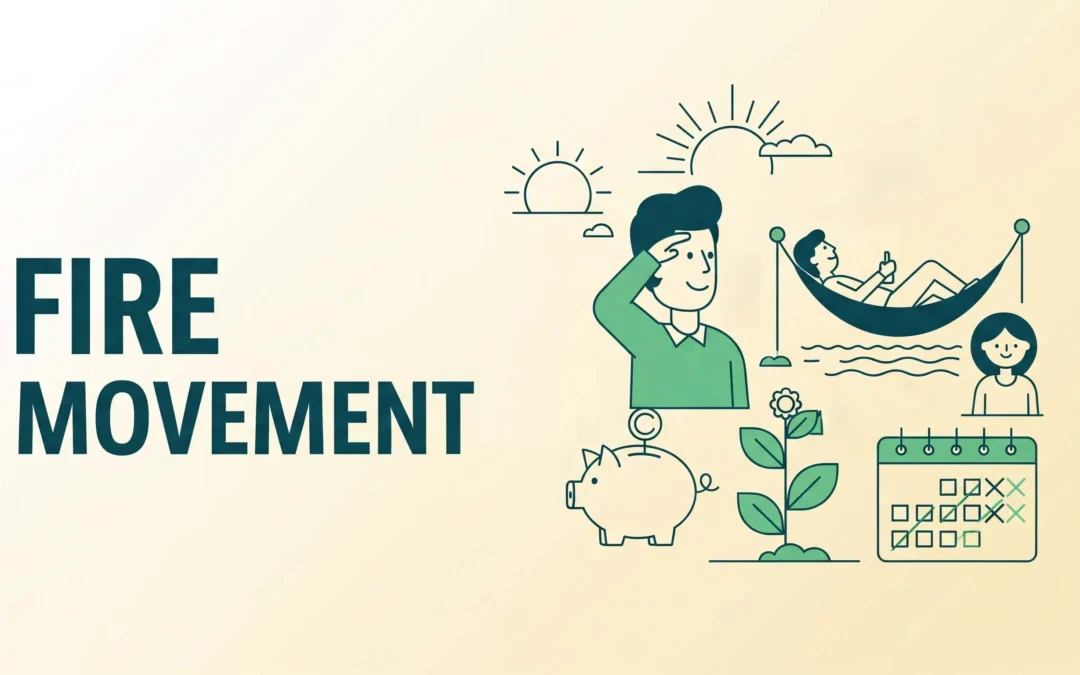Different individuals have different life goals. Some may prioritize building wealth to pass down to the next generation, and some may focus on earning enough to travel and enjoy life. FIRE is one such initiative that motivates people to save huge amounts in the early stages of their lives. Later, they can retire early and live a quality life. But is it suitable for all?
As fascinating as it may sound, it is important to understand this concept properly, weigh its pros and cons, and then make a decision. This article will guide you to understand FIRE thoroughly.
What Is the FIRE Movement?
FIRE (Financial Independence, Retire Early) is a personal finance lifestyle that encourages people to reach financial independence well before the traditional retirement age by aggressively saving and investing a significant portion of their income, typically 50% or more.
Adapting FIRE necessitates tailoring the approach to Indian realities, such as inflation, healthcare costs, and joint family structures, as fixed pensions are uncommon and family financial responsibilities are significant in India.
Fundamentals of FIRE:
- High Savings Rate: Usually between 50 and 70 percent of income.
- Living economically means cutting back on unnecessary spending.
- Building wealth with stocks, index funds, equity mutual funds, and other long-term assets is known as “smart investing.”
- Determining the amount of corpus required to retire and live off of passive income is known as goal-based planning.
The formula used for FIRE:
| Component | Formula/Example |
| Retirement Corpus | Annual Expenses × 25 |
| Annual Withdrawal Rate | 4% (as per the “4% Rule”) |
| Example | Rs. 6 lakh annual expense × 25 = Rs. 1.5 crore corpus |
Is FIRE feasible in India?
India is a developing country, and hence, let us check the feasibility of FIRE based on the pros and cons.
FIRE’s benefits in India
- Freedom from 9–5 Jobs: You are free to engage in hobbies, passion projects, or launch your own company without worrying about money. It makes it possible to live a life centred on self-actualization rather than income.
- Improved Work-Life Balance: The ongoing stress of rigorous jobs and corporate burnout is eliminated with early retirement. More time spent with loved ones and better mental health are the results of this.
- Early Financial Discipline: FIRE compels you to start saving, investing, and budgeting early in life. This creates lifelong habits and long-term wealth.
- Potential for Geo-Arbitrage: You can move to a smaller town with cheaper living expenses and still maintain the same quality of life. This prolongs your retirement savings without compromising your comfort level.
Difficulties in the Indian Setting:
- Healthcare Costs: Emergencies can deplete savings due to growing medical inflation and little government assistance. Critical illnesses or long-term care may require more than just health insurance.
- Family Expectations: Work life may be prolonged by financial obligations to elderly parents, weddings, or children’s education. Cultural norms frequently put family before personal financial objectives.
- Taxes and Inflation: Over time, inflation lowers the actual value of your retirement fund. Your post-retirement income may also be impacted by dividend and capital gains taxes.
- Social Pressure: Society or extended family may view early retirement as irresponsibility or laziness. In a traditional setting, constantly defending your way of life can be emotionally taxing.
How to Start Your FIRE Journey in India?
After reviewing the pros and cons, if you have decided to start the FIRE journey, let us guide you with the steps below:
1. Establish Your FIRE Number
Determine how much money is required to support yourself comfortably if you don’t work. Apply the 25x Rule by multiplying your anticipated yearly spending by 25.
For instance, if your expenses are around Rs. 6,00,000, then Rs. 1.5 crore (Rs. 6,00,000 * 25) in corpus required for retirement.
2. Monitor and Make the Most of Your Spending
- To keep an eye on every rupee you spend and analyse later, use apps like Money Manager, Walnut, or even Excel sheets.
- Start reducing lifestyle inflation by identifying wasteful spending.
- Prioritise cutting back on EMIs, eating out, luxuries, and impulsive buying whenever or wherever not necessary.
3. Make aggressive savings (between 50 and 70 per cent of income)
- Set a saving target of 30% at first, then progressively raise it as income increases or spending decreases.
- Set up mutual fund SIPs (Systematic Investment Plans) to automatically save money each month.
4. Diversify and Invest Sensibly
To create a strong, inflation-beating portfolio, invest across a variety of asset classes.
Example:
| Investment Option | Approx Return (p.a.) | Risk Level | Suitability |
| Equity Mutual Funds | 10–12% | Moderate-High | Long-term growth |
| PPF/EPF | 7–8% | Low | Fixed-income stability |
| Index Funds (Nifty 50) | 10%+ | Moderate | Low-cost investing |
| REITs/FDs | 6–7% | Low-Med | Income + diversification |
| Gold/Govt Bonds | 5–6% | Low | Hedge against inflation |
5. Create Sources of Passive Income
Your lifestyle is supported by passive income rather than just your FIRE corpus.
Think about options that produce consistent revenue with little work, such as digital products, dividend-paying stocks, freelancing, or rental income.
6. Secure Sufficient Insurance and Emergency Fund
- To prevent unforeseen financial shocks, protect your FIRE plan with health and term life insurance.
- For additional protection, keep an emergency fund in a liquid or savings account that is equivalent to six to twelve months’ worth of expenses.
7. Regularly Review and Adjust
As life circumstances, inflation, and market trends change, so should your FIRE plan.
Every six to twelve months, review and rebalance your objectives, investments, and spending.
Bottomline
The conclusion can be drawn that FIRE is an important concept of personal finance. Step-by-step instructions provided in this article will help you start your journey as soon as possible so that a big corpus is ready by the time you decide to retire. Other important information, like the downside of FIRE, is also listed to help you make an informed decision.
Personal finance is a subjective topic, and hence, rushing into decisions is not advised. It is important to understand the reason before opting for any strategy for long-term success.


